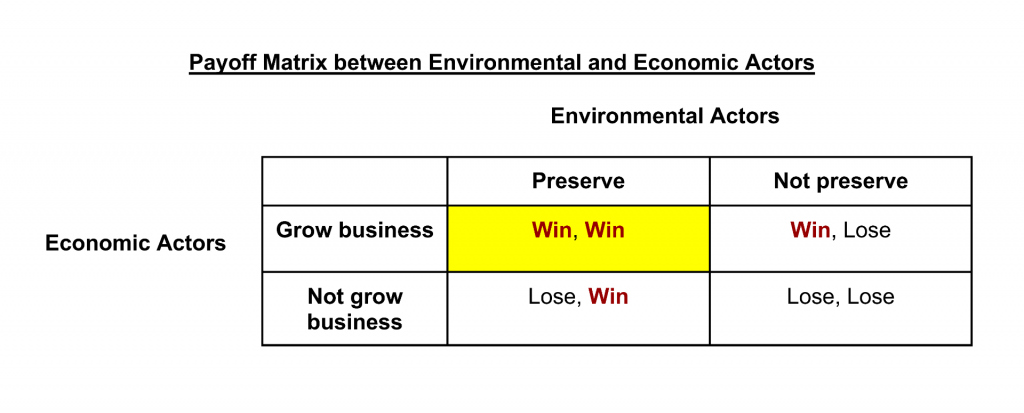Economy VS Environment: Not Always a Zero-Sum Game
Economic growth and environmental protection are often described as mutually exclusive – in other words, trade-offs, where we cannot have one without the other. In both developed and developing countries, our history has demonstrated that our environment tends to suffer as the global economy continues to grow and prosper. While this debate remains controversial, environmental organizations and industry actors tend to be in conflict with each other’s interests. This relationship is often considered as a zero-sum game, which is a situation where one participant’s gain or loss is balanced by the losses or gains of the other participant respectively. However, this article suggests that the environment and the economy can co-exist and prosper at the same time. We CAN preserve the environment AND grow the economy.
The rise of technology and growth of knowledge in our current age has enabled ways to unite the conflicting interests of the economy and the environment. For example, businesses who produce solar panels do not only make money by selling them, but also protect the environment by providing an alternative renewable energy resource that mitigates climate change. Another intervention that has turned this conflict into a productive opportunity for both sectors is eco-tourism (i.e. for tropical rainforests, coral reefs, etc.), which has helped revive endangered communities by providing its people with employment opportunities while also preserving biodiversity.
In light of these creative ways that help both industries meet their private interests, I have developed a payoff matrix below to visualize the possible relationships between environmental and economic actors from the perspective of Game Theory.
In this game, there are two players: environmental actors and economic actors/ businesses. Environmental actors can choose between two potential strategies: to preserve or to not preserve. Economic actors also have two potential strategies: to grow the business or to not grow the business. There are four scenarios in this payoff matrix:
- If environmental actors choose to preserve, economic actors’ best response is to grow their business because choosing to grow the business gives them a higher payoff (win) than not growing the business (lose).
- If environmental actors choose to not preserve, economic actors’ best response is to grow their business because choosing to grow the business gives them a higher payoff (win) than not growing the business (lose).
- If economic actors choose to grow the business, environmental actors’ best response is to preserve because choosing to preserve gives them the most optimal payoff (win) than not preserving (lose).
- If economic actors choose to not grow the business, environmental actors’ best response is to preserve because choosing to preserve gives them the most optimal payoff (win) than not preserving (lose).
In this game, where interventions and technologies have enabled the environment and the economy to co-exist, the pair of strategies (Win, Win), where economic actors grow the business to win and environmental actors preserve the environment to win, is the pure strategy Nash Equilibrium. Given the real-life examples of new and innovative interventions that meet the best interests of both economic and environmental actors, the results of this game indicate that there is indeed a pair of strategies that are best responses to each other.
Therefore, as the article reflects on this relationship between the environment and the economy, it also demonstrates examples of interventions which show that environmental stewardship and economic prosperity are indeed not mutually exclusive – especially considering the increasing amount of interest and support that modern society has shown within this intersection. Because there are now multiple stakeholders such as the government, the private sector, environmental NGOs, and other agencies advocating for this positive change, more and more people are becoming aware of the understanding that a healthy environment is beneficial to not just humans and living organisms, but also to businesses themselves.

